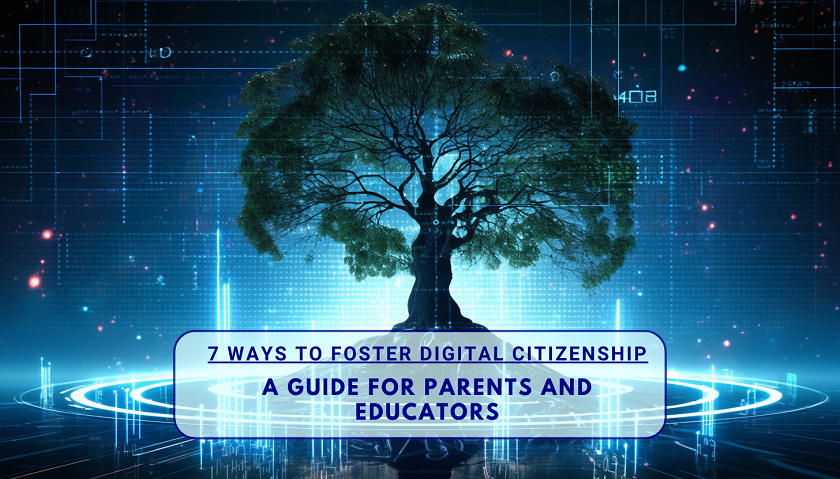1. Understanding Digital Citizenship: The First Step Towards Future
In the digital age, the concept of citizenship extends beyond physical boundaries and into the digital realm. Digital citizenship isn’t just about understanding how to use technology; it’s about fostering respect and appreciation for the resources at our disposal. This is where we, as parents and educators, have a pivotal role in “Empowering Wisdom, Igniting Courage” in our children. Join us in the discussion as we review 7 Ways to Foster Digital Citizenship: A Guide for Parents and Educators.
“The future belongs to those who understand that doing more with technology comes with a responsibility to also do better”.
2. Recognizing the Role of Technology and AI in Education: A Learning Revolution
Technology, particularly Chromebooks, has become an indispensable part of modern education. These devices have revolutionized learning, making it more interactive, engaging, and accessible. The advent of artificial intelligence (AI) has further transformed the educational landscape, offering personalized learning experiences and instant feedback. I found a very cool posting from soocial.com with some interesting statistics to support this topic which I would like to share. Did you know, over the next three years, more than 47% of learning management tools will be powered by AI, and research shows that 20% to 40% of the current workload of teachers can be automated using current technology? Even more impressive, an AI-enabled chatbot can respond to a student’s question in a mere 2.7 seconds. As these tools become more complex, it’s crucial to understand and respect their capabilities.
————————————————-
3. Addressing the Issue of Vandalism: A Call for Responsibility
Chromebook vandalism has become an alarming issue that adversely impacts both student learning and school budgets. While it is important to note that the estimated yearly cost of school vandalism is approximately $500 million according to an Office of Justice Programs Report. This figure encompasses various forms of damage, not exclusively limited to Chromebook vandalism. Nonetheless, the prevalence of Chromebook vandalism demands immediate attention and action.
This disrespectful behavior undermines the educational environment and hampers students’ learning experiences. It also places an unnecessary financial burden on schools, diverting funds that could be better utilized for educational resources. To address this challenge effectively, it is crucial to instill a sense of responsibility and respect for technology among students.
4. Involving Parents in Digital Citizenship: Empowering Wisdom, Igniting Courage
As parents, we have a responsibility to instill a sense of respect and responsibility in our children. It’s our duty to empower them with the wisdom to use technology responsibly and ignite the courage in them to stand against misuse and vandalism. This isn’t just about preventing damage to physical devices; it’s about teaching our children the ethics of using advanced tools like AI.
5. Understanding the Dilemma Faced by Schools: Balancing Budgets and Learning Needs
Schools, too, face a dilemma. They need to provide students with these essential learning tools but must also manage their budgets effectively. It’s a delicate balance that requires careful thought and planning.
6. Teaching the Ethics of Technology Use: Instilling Values in the Digital Age
As technology becomes more complex, teaching students about the ethics of using these tools becomes even more critical. We need to ensure our children understand the potential consequences of misuse, especially with powerful technologies like AI. It’s about instilling values of respect, responsibility, and ethical use. A 2017 study found that young adults aged 19–32 years who frequently used social media were more than three times as likely to feel socially isolated than those who did not use social media as often. This shows that misuse or overuse of technology can lead to unintended negative consequences according to an article from Medical News Today which you can read by clicking here.
7. Implementing Solutions to Promote Digital Citizenship: A Community Effort
So, what can we do to address this issue? Potential solutions could include stricter rules for Chromebook use, consequences for vandalism, and educational programs about digital citizenship and respect for technology. Community initiatives to raise awareness about the issue could also be beneficial.
Conclusion: Empowering Wisdom, Igniting Courage
In conclusion, fostering digital citizenship is not just about teaching our children how to use technology responsibly, but also about instilling in them the courage to stand against misuse and vandalism. It’s about empowering them with the wisdom to make the right decisions when using these powerful tools. As we continue to navigate the digital age, let us remember our ethos: “Empowering Wisdom, Igniting Courage”. This embodies our commitment to transforming our students into lifelong learners, capable of using technology not just for their personal growth, but also for the betterment of society. Let’s work together to create a future where digital citizenship is a norm, not an exception.
Act Now: Empower Digital Citizens for the Future:
As parents, educators, and responsible digital citizens, it’s time for us to step up. Let’s commit to educating ourselves and our children about the importance of respect and responsibility in the digital world. Let’s strive to implement stricter rules for technology use and create a culture of accountability. We need to equip our children with the wisdom to value and respect technology, and ignite the courage in them to use these tools responsibly and ethically.
Let’s not wait for change to happen; let’s be the change. Join us in this mission to empower wisdom and ignite courage in our digital citizens of tomorrow. Start by sharing this post with your community, discuss these issues with your children, or organize an awareness event in your local school. Every step counts. Together, we can make a difference.
Remember: “The future belongs to those who understand that doing more with technology comes with a responsibility to also do better.”








This is the most interesting thing I have read in the last 3 decades crazy how the worlds has changed
Thank you for sharing your thoughts, Alexandria. It is truly amazing to see how much the world has changed in just a few decades, especially with the rise of technology and digital citizenship. As parents and educators, it is important that we stay informed and educated on the best practices for fostering digital citizenship in our children and students. The tips provided in the article can be a great starting point for creating a safe and responsible online environment.